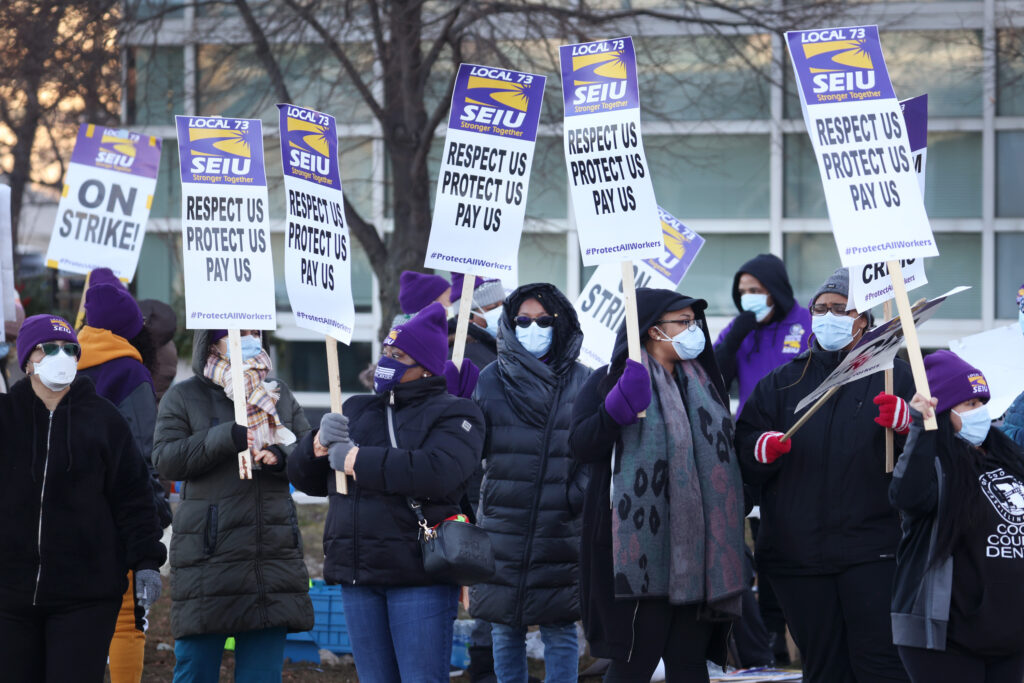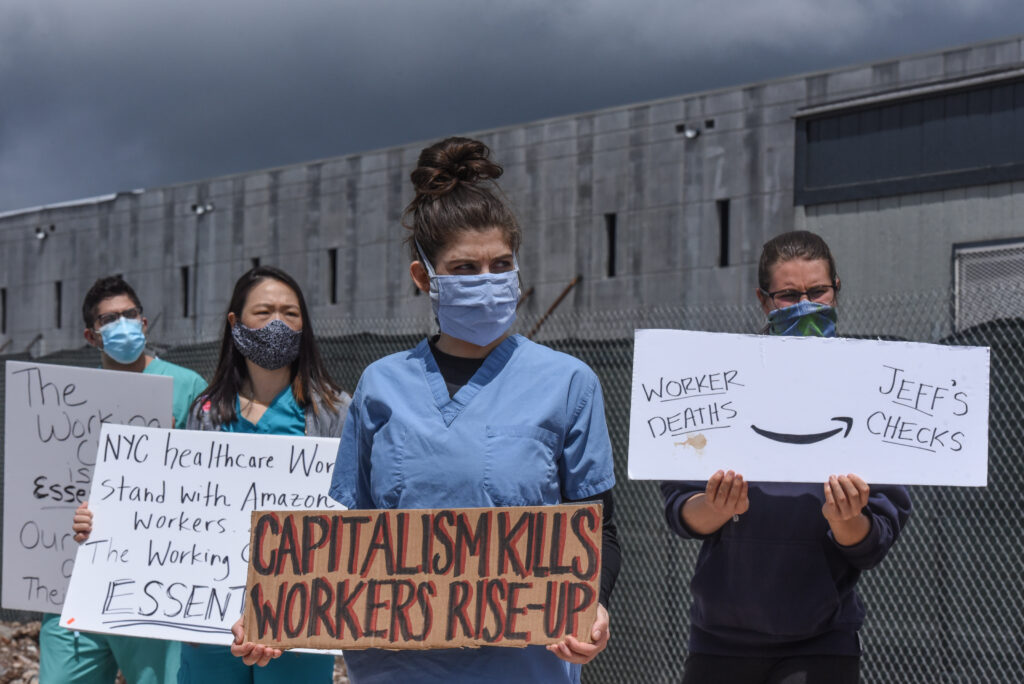This article is part of our series “On the Precipice: A Progressive Agenda in the Biden Era.” Download a PDF of the full series here.
As the COVID-19 pandemic continues to rage, the deck remains stacked against the working class: a faltering economy with sky-rocketing inequality; bad labor laws and an even worse business-friendly judiciary enforcing them; trade policies that cede too many rights to corporations; unchecked climate chaos; and complacency in too many parts of organized labor. The incoming Biden administration projects it’s desire to be the most labor-friendly presidential administration ever, but without organized public pressure, they quickly will be mired in merely reversing problems created in the last four years without any plan to comprehensively address the structural losses of the last 40 years. This kind of piecemeal approach will not be enough to advance the change working people need. A better future for workers and labor is possible, but only if we demand it.
Present Context
In August, the United Electrical, Radio and Machine Workers of America (UE) General Executive Board, comprised of elected rank and file members and UE’s national officers, issued a statement declaring that “The working class cannot afford four more years of Trump,” and recognized that the only way “to oust Trump from office…is to elect Joe Biden.”
Less an endorsement of Biden so much as a grounded understanding of the actions the Trump administration had taken, they wrote: “President Trump has attacked workers’ rights much more aggressively than any of his predecessors, weakening regulations and stacking the Department of Labor, the National Labor Relations Board and OSHA with corporate henchmen. His appointments to the Supreme Court resulted in anti-worker rulings, including the Janus decision to weaken public-sector unions, and his ongoing effort to fill the federal courts with anti-worker judges promises more such decisions well into the future.”
On November 3, in an election with record-high turnout, Biden was elected president. According to exit polls, working-class voters made up a larger share of the electorate and voted more Democratic than they had in the 2016 presidential election, while wealthy households continued to vote more heavily for Trump. Of people voting in union households 57% voted for Biden this year while 40% voted for Trump, a significant shift compared to 2016, when Trump only lost the union household vote by eight points.
This is a good result for labor. It offers the opportunity for unions to put forward bold demands for what the Biden administration should do to improve both conditions for organizing and the economy more broadly.

Unfortunately, it seems that so far, labor leaders are focused on who will head the Labor Department, not what that person should be doing and how it should dovetail with other economic policies. That it took Biden so long to nominate his longtime friend Marty Walsh for the position is somewhat discomforting, and it suggests Biden’s own lack of clear vision for what this person should accomplish.
Ultimately, organized labor must have a more programmatic approach to improving its power through advancing workers’ economic interests. While the dramatic unemployment numbers from early in the pandemic have subsided, the Economic Policy Institute points out that more that 25.7 million U.S. workers are still impacted by job loss or reduced hours. And of course, those hardest hit by these job losses are those who already had the fewest resources. Wealth inequality has increased, while Jeff Bezos, Elon Musk, the Waltons, and others have reached previously unfathomable levels of wealth. The emergency relief bill that Congress passed at the end of 2020 is far short of what working people need to heal from COVID-19 and end the economic suffering the pandemic has unleashed.
What the Working Class Needs
Before we limit our goals based on political realism, it’s important to be clear about what the working class really needs. The first priority must be correcting the course of the economy. Any new stimulus program must provide funds to state and local governments to prevent mass layoffs and budgets cuts. Beyond that, we need a comprehensive jobs guarantee program geared towards meeting people’s needs and addressing the threat of climate change and any future public health emergencies — a “Green New Deal.” This will require massive investment in infrastructure, healthcare and education. That investment should come with requirements that the jobs created be quality, union jobs, targeted toward the communities and populations that have suffered the most from deindustrialization, the climate crisis and systemic racism.
The COVID-19 pandemic has made it starkly clear that the federal government must do more to provide healthcare for all, regardless of employment. To permanently fix our nation’s broken healthcare system, we need the kind of Medicare for All, single-payer healthcare system that UE has supported since the 1940s.
Workers also need better rights to organize — our lives depend on it. A recent study found that unionized nursing homes in New York had 42% fewer COVID-19 infections and 30% fewer deaths than non-union nursing homes. Worker action has been crucial to winning personal protective equipment and safety policies across the country. This is taking place not only in UE and other union shops but also in unorganized workplaces. We need Congress to pass comprehensive labor law reform, such as the Workplace Democracy Act and the PRO Act, to give workers full rights to organize, bargain collectively, and strike.
What We Can Expect
There are likely to be some pro-worker improvements out of this administration, especially in areas that they can link to controlling the pandemic. Early among them ought to be an “Infectious Disease Standard” from the Occupational Safety and Health Administration (OSHA). Such a rule would require healthcare facilities and potentially most other workplaces to proactively implement infectious disease control protocols. Organized labor also anticipates the reversal of unfavorable National Labor Relations Board rulings, and filling vacant OSHA investigator positions.
These measures, while helpful, only tinker around the edges of federal labor laws that favor employers, not workers, and are also antiquated under present working conditions. Simply reversing a number of bad rulings will not advance organized labor, which now represents fewer than 10% of U.S. workers. A Labor Secretary Walsh will not provide much inspiration.
Furthermore, Republican Senator Mitch McConnell’s success at packing federal courts with corporate-friendly judges will have a long-term impact on workers’ rights, regardless of Democratic control of the Senate. The labor movement will experience continued fallout from the Supreme Court’s decision to allow public sector workers to avoid paying union dues while benefiting from union negotiated contracts. Labor should be prepared for the possibility that the Court could expand that ruling into the private sector too.
Working people cannot rely on the courts to protect them. The judiciary has always prioritized protecting the institutions that preserve the status quo, from Dred Scott to new Supreme Court Justice Amy Coney Barrett’s Seventh Circuit rulings upholding racial discrimination at work, conceding new rights only when the public demands them.
Additionally, activists will need to be prepared to mobilize swiftly to prevent new trade deals that favor corporations. Biden was an architect of the ultimately failed Trans Pacific Partnership (TPP), and he may try to revive it. That said, his nominee for U.S. Trade Representative, Katherine Tai, is a positive step. Tai led negotiations over NAFTA 2.0 for the Democratic majority in Congress. There she helped to strengthen provisions in the new agreement that protect Mexican workers’ ability to form independent unions and negotiate for better pay and benefits. Improving the wages and working conditions for workers in other countries is the best way to prevent U.S. firms from moving production overseas and provide opportunities to reinvest in domestic manufacturing.
Tai’s nomination demonstrates that the old “free trade” model, embodied by NAFTA, the World Trade Organization, and the proposed TPP, and embraced for decades by both Republicans and corporate Democrats, is no longer viable. However, it remains to be seen how much Tai, and the Biden administration, are committed to policies that raise the wages and working conditions of workers, especially manufacturing workers, in all countries. Those are the only kind of policies that will truly protect our jobs from globalization. Working people will still need to stay alert and be ready to keep the pressure on.
So far, Biden’s choices for his Cabinet and advisors largely favor predictable corporate centrists and cronies from the Obama administration. Three of his picks are employees of BlackRock, the world’s largest asset manager and proponent of corporate deregulation. His nominee for Defense Secretary is on the board of Raytheon, one of the world’s largest weapons manufacturers. The working class should be suspicious of their warmongering.
However, a surprisingly positive counterpoint to these centrist voices is Deb Haaland, Biden’s nominee for Secretary of the Interior. In addition to the significant impact of having a Native American woman lead the department that governs the Bureau of Indian Affairs, Haaland is from the working class and has been an outspoken activist both before and during her term as a Congresswoman.
Centrist Democrats, including Biden, have thus far remained unwilling to even consider the Green New Deal. Labor should seize any opportunity to enact GND’s proposals, even in a piecemeal fashion, while recognizing that this approach alone will not achieve full climate or economic justice.
With the Georgia Senate runoff races completed and a Democratic Senate confirmed, the Biden administration will have a brief two-year window to push forward bold proposals.
How We Get What We Need
The dramatic economic downturn induced by the pandemic presents opportunities for the working class, but only if we are united enough to advance a plan that benefits the long-term interests of workers, not those of corporations. That can only be won through visible actions that disrupt business as usual — literally.
There is good reason to believe that popular support can be mobilized to pressure Biden and Congress, especially if labor takes a leading role and builds a broad coalition that includes Black Lives Matter and environmental activists. While Democrats were not particularly popular in the recent election, pro-worker policies were.
In Florida — where Trump did significantly better than in 2016 — a super-majority of voters passed an initiative to institute a $15 minimum wage. The Labor Campaign for Single Payer said in an email sent to supporters that, “Even though the Democrats lost seats in Congress, not a single cosponsor of the Medicare for All Act was defeated. … Even Medicare for All supporters in swing districts…were re-elected while swing district opponents went down in defeat.”
Organized labor should be prepared to think and act creatively with the opportunities available to them. We’ve inherited a federal government decimated by underfunding and privatization. We can rebuild trust in our institutions by using them to put people to work building more resilient communities, and we should start where we find a friendly audience. For example, with Haaland as Interior Secretary, what kinds of green jobs programs could we create to enhance our natural resources, rather than exploit them? Perhaps she can shape a new Civilian Conservation Corps whose members replace lead water lines and remove coal ash, while earning a living wage.

Another possibility: the choice of Xavier Becerra for Secretary of Health and Human Services is odd, considering his lack of experience in public health. He has previously supported calls for Medicare for All, but has agreed to go along with Biden’s desire not to advance that plan. Becerra’s wife, Carolina Reyes, has made a career in advancing maternal medicine in medically underserved communities, and perhaps she can be a positive influence. As the U.S. struggles to control the pandemic and administer vaccines, labor should support a robust investment in the existing but underfunded National Health Service Corps, which is administered by the Department of Health and Human Services. Let’s pay union wages to thousands of workers to be trained on testing and vaccination protocols and also pay for their future college education in the healthcare field.
We should also be prepared to advance bold proposals even where our allies are more limited. For example, UE Local 506 members make locomotive engines in Erie, Pennsylvania, earning solid wages and benefits through their years of union struggle. UE members there would love to be on the forefront of making electric locomotives powered by clean energy for a national high-speed railway. It is unclear whether Pete Buttigieg, Biden’s nominee for Transportation Secretary, has the vision to advance a plan that could so positively impact many aspects of our economy and climate change, but that doesn’t mean we shouldn’t advocate for this ambitious idea.
Workers must make our struggles visible in the streets in order to push for the policies we need, using tactics such as mass marches, strikes, and civil disobedience, including occupations of workplaces. This will be the only way to compel capitalist structures to concede to our demands. Those parts of the labor movement that still know how to execute these actions should pass on their knowledge to a new generation of activists. Given recent events, such actions will need to be carefully organized to target capital’s interests, not just create theater on Capitol Hill.
By focusing on issues that directly impact working people and their families, the labor movement can begin to heal divisions that have been amplified during the current administration. While Biden’s victory is clear, Trump received tens of millions of working-class votes. As UE’s officers noted in a statement following the January 6 insurrectionist violence at the capitol, “The growth of far-right and white-supremacist groups is not only a danger to our democracy, and to the lives and safety of people of color, it is also a roadblock to the working-class unity that we need to win economic justice and a decent standard of living.” Neither the election results nor recent turmoil mean that either Biden or unions should pander to Republicans. Rather, this increases the necessity of putting forward a bold program that will unite people around our common working-class interests.
Kari Thompson is Director of International Strategies and Co-Director of Education at UE. Prior to joining UE staff, she was a rank-and-file UE member in Iowa.



